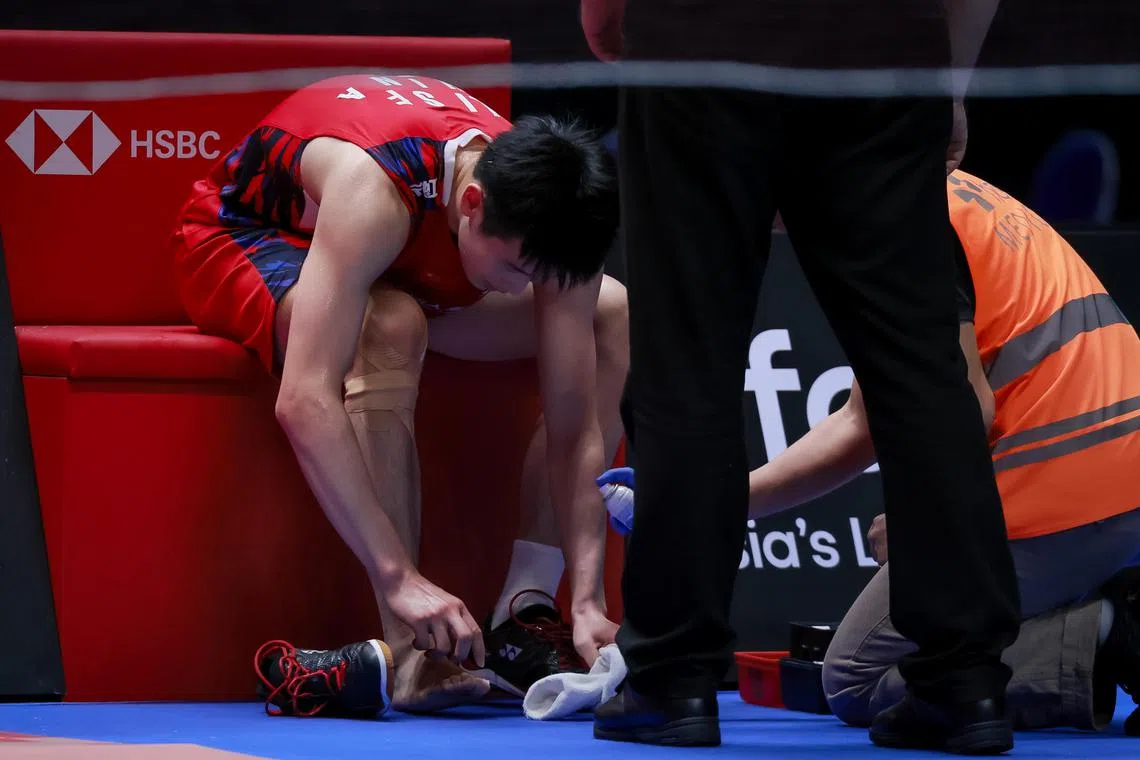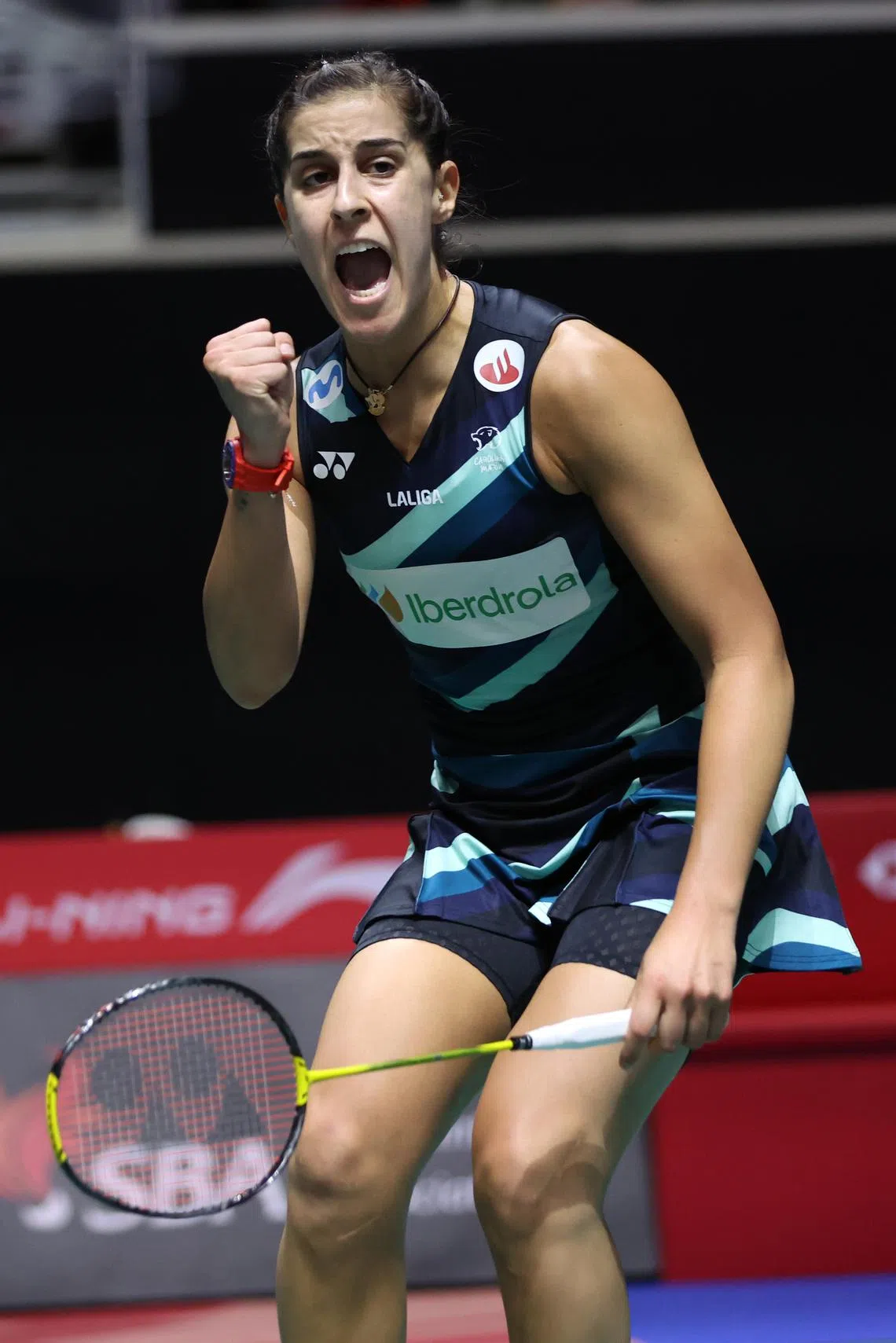Advantage, gamesmanship? Not all agree it’s good for badminton
Sign up now: Get the biggest sports news in your inbox

China's Li Shifeng during his medical timeout at the KFF Singapore Badminton Open men's singles quarter-finals on May 31.
ST PHOTO: GAVIN FOO
SINGAPORE – Loud boos were heard at the Singapore Indoor Stadium on May 31, when China’s world No. 6 Li Shifeng called for a medical timeout to attend to his right leg, just as his six-point run came to an end while leading 18-15 against home favourite Loh Kean Yew.
Li, who went on to win the quarter-final 21-19, 21-16
Clearly not a fan favourite, gamesmanship has reared its head increasingly in badminton and other sports, with tennis players, basketballers and footballers also among the culprits.
Gamesmanship is the practice of using questionable methods that are not against the rules, though they can sometimes border on unsportsmanlike behaviour, to gain a psychological advantage.
In the largely gentleman sport of badminton, it veers from the funny to the frustrating. To distract opponents, players sometimes move their racket in comical circles before serving.
They may also try to affect their rivals’ rhythm by serving too early or delaying it. Receivers may also raise their hand late to show they are not ready, forcing a re-serve.
French mixed doubles player Thom Gicquel told Olympics.com: “Sometimes when you lose two or three points in a row, you want to change the shuttle even if it’s a good one.”
In their 2022 Japan Open men’s singles semi-final, Anders Antonsen and eventual champion Kenta Nishimoto were both culpable. At one point, the Dane indicated he was not ready, but when Nishimoto’s premature flick serve went long, Antonsen celebrated to claim the point. Ultimately, the umpire called for a repeat of the serve.
In a vodcast with former Danish player Hans-Kristian Vittinghus, Antonsen noted that “these are all small games to get the advantage in the game”.
He added: “There’s so much going on – the umpire, the commentators, the fans have absolutely no idea. Just assuming everyone is following the rules 100 per cent is absolutely not true. There’s so many small games going on during the match. It’s how the game works.”
Other gamesmanship attempts include frequent towel breaks and requests to dry the court, and walking in circles before getting in the ready position.
Then there is the excessive screaming, which women’s singles player Carolina Marin is infamous for.
The 2016 Olympic and three-time world champion explained to ESPN: “That’s my character. It gives me power and confidence on court. Sometimes I’ve to control it, but it’s a way of telling opponents that they don’t stand a chance against me.”

Carolina Marin is infamous for her excessive screaming.
PHOTO: EPA-EFE
Denmark’s men’s doubles player Rasmus Kjaer admitted it can get into their heads, as he told Olympics.com: “We get a bit irritated sometimes when they shout too much and then we also shout. Sometimes you get a bit too aggressive on court and make some errors.”
To police the situation, umpires may dish out verbal reminders, yellow card warnings and red cards which lead to a point awarded to the opponent, and black cards which mean disqualification. Hawk-Eye technology
There are also other notable incidents in other sports.
Monica Seles was credited as the pioneer of tennis grunting which threw off her rivals, while play-acting is common in football as fans would laugh or cringe at Cristiano Ronaldo and Didier Drogba’s attempts to win penalties or get opponents booked.
Basketball is known as much for its trash talking as its slam dunks. Famously, in Game 1 of the 1997 National Basketball Association Finals, Chicago Bulls’ Scottie Pippen psyched out his Utah Jazz rival Karl Malone, nicknamed the Mailman, by telling him “the mailman doesn’t deliver on Sundays” – causing him to miss two late free throws that led to a Bulls win.
Learning to deal with gamesmanship is key and, in his work with local athletes, Singapore Sports Institute’s senior sports psychologist Harry Lim advises them it could happen and to focus on things they can control instead. Self-talk and breathing exercises are also some techniques he has taught them to employ in such situations.
He said: “When such behaviour happens, it grates on them, if they have the momentum and are anxious and hurried to win the next point. It could tip you off balance as you are in the flow and opponents try to disrupt that.
“Be aware why this is affecting you, why opponents are doing this. Don’t react to such strategies. Keep yourself in the right headspace and regulate your emotions and attention appropriately.”
Meanwhile, Taiwanese world No. 13 Chou Tien-chen remains a purist and eschews the win-at-all-cost mentality of gamesmanship.
He told the Sunday Times: “So what if you win the point, or the match, or the title in such a manner? Is this the kind of behaviour you want future generations to remember you for? What would become of the sport if everyone resorts to such antics to try and win?
“We should promote badminton in a positive way. I believe it is possible to be competitive and still be role models.”


